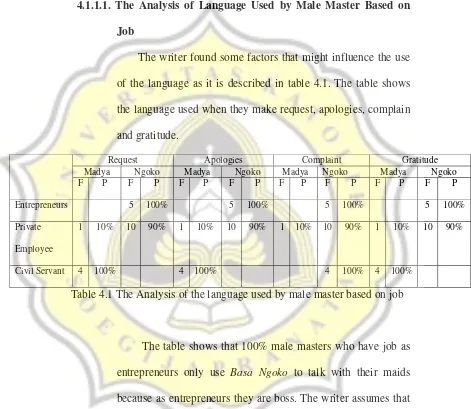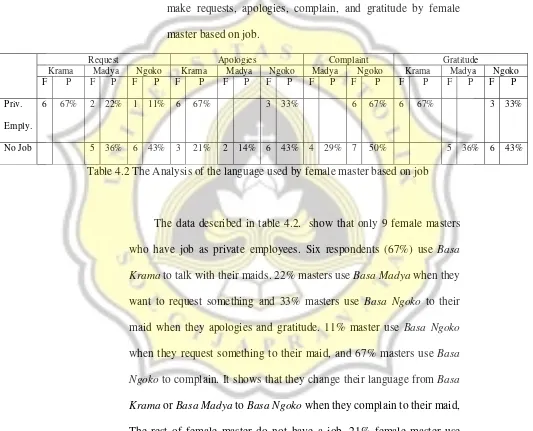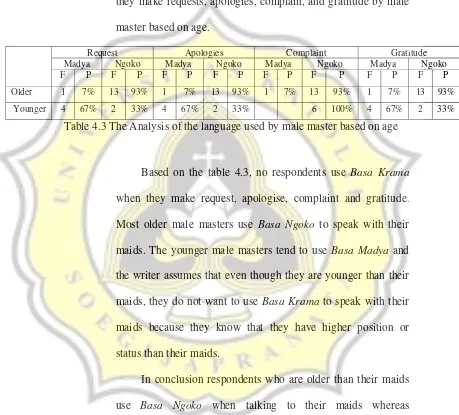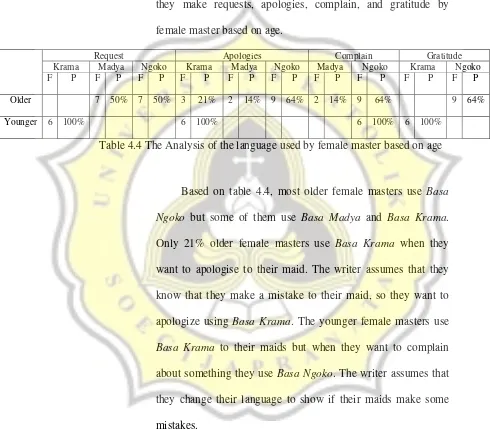CHAPTER IV
DATA ANALYSIS AND INTERPRETATION
This chapter answers the research question of this thesis. The data are collected from 20 couples who have maids. As the respondents are masters, it is a fact that they have power on the maids. However, the writer analysed whether age, gender, and job influence the use of Javanese language between masters and maids. The data got from the questionnaire and interviews are presented below.
4.1 The influence of Social Stratification
In this study the writer sees age, gender, and job influence the use of Javanese language between masters and maids. The writer analysed whether age, gender, and job influence the use of Javanese language between masters and maids.
4.1.1 Job
Thus, the master can use Basa Ngoko to their maid in every condition because the maids’ position is lower than the masters.
4.1.1.1. The Analysis of Language Used by Male Master Based on
Job
The writer found some factors that might influence the use of the language as it is described in table 4.1. The table shows the language used when they make request, apologies, complain and gratitude.
Request Apologies Complaint Gratitude
Madya Ngoko Madya Ngoko Madya Ngoko Madya Ngoko
F P F P F P F P F P F P F P F P
Entrepreneurs 5 100% 5 100% 5 100% 5 100%
Private
Employee
1 10% 10 90% 1 10% 10 90% 1 10% 10 90% 1 10% 10 90%
Civil Servant 4 100% 4 100% 4 100% 4 100%
Table 4.1 The Analysis of the language used by male master based on job
90% respondents, who are private employees, use Basa Ngoko. The rest 10% male masters use Basa Madya. The writer assumes that these respondents may feel that they have same position as employees with their maids. All the civil servant respondents use Basa Madya. None of them use Basa Krama or Basa Ngoko. The writer assumes that civil servants want to express their respect to their maids. The writer assumes that they usually use Javanese in their work place, as all civil servants are Javanese. Eventhough they know that they have the same position with their maids; they know that they have a power to their maid and their maids are their employees. But when they want to complain they use Basa Ngoko to their maid, they feel that their maids have made some mistakes so they complain their maids’ work.
4.1.1.2. The Analysis of Language Used by Female Master Based on
Job
This table shows the analysis of language used when they make requests, apologies, complain, and gratitude by female master based on job.
Request Apologies Complaint Gratitude
Krama Madya Ngoko Krama Madya Ngoko Madya Ngoko Krama Madya Ngoko F P F P F P F P F P F P F P F P F P F P F P
Priv.
Emply.
6 67% 2 22% 1 11% 6 67% 3 33% 6 67% 6 67% 3 33%
No Job 5 36% 6 43% 3 21% 2 14% 6 43% 4 29% 7 50% 5 36% 6 43%
Table 4.2 The Analysis of the language used by female master based on job
Thus, female respondents who work tend to use Basa Krama when talking to their maids but not when they complain. They change the level of Javanese language they use from Basa Krama to Basa Ngoko. This is similar to the finding on the language used by the male masters who are civil servants. Another interesting fact is that Female respondents who have no jobs tend to use Basa Ngoko with their maids. When people have higher position, they will use Basa Ngoko to the lower social class (Koentjaraningrat (2004:329-330)). Nonetheless, related to the bosses’ job, the writer can conclude that the bosses who have jobs will use Basa Madya and Basa Krama. While the jobless female respondents use Basa ngoko. This may be influenced by the situation where the jobless female respondents always give order or command to their maids everyday so that they have intimacy with the maids.
4.1.2 Age
4.1.2.1 The Analysis of Language Used by Male Master Based on
Age
This table shows the analysis of language used when they make requests, apologies, complain, and gratitude by male master based on age.
Request Apologies Complaint Gratitude
Madya Ngoko Madya Ngoko Madya Ngoko Madya Ngoko F P F P F P F P F P F P F P F P
Older 1 7% 13 93% 1 7% 13 93% 1 7% 13 93% 1 7% 13 93%
Younger 4 67% 2 33% 4 67% 2 33% 6 100% 4 67% 2 33%
Table 4.3 The Analysis of the language used by male master based on age
Based on the table 4.3, no respondents use Basa Krama when they make request, apologise, complaint and gratitude.
Most older male masters use Basa Ngoko to speak with their maids. The younger male masters tend to use Basa Madya and the writer assumes that even though they are younger than their maids, they do not want to use Basa Krama to speak with their maids because they know that they have higher position or status than their maids.
4.1.2.2. The Analysis of the language used by female master based on
age
This table shows the analysis of language used when they make requests, apologies, complain, and gratitude by female master based on age.
Request Apologies Complain Gratitude
Krama Madya Ngoko Krama Madya Ngoko Madya Ngoko Krama Ngoko F P F P F P F P F P F P F P F P F P F P
Older 7 50% 7 50% 3 21% 2 14% 9 64% 2 14% 9 64% 9 64%
Younger 6 100% 6 100% 6 100% 6 100%
Table 4.4 The Analysis of the language used by female master based on age
Based on table 4.4, most older female masters use Basa Ngoko but some of them use Basa Madya and Basa Krama. Only 21% older female masters use Basa Krama when they want to apologise to their maid. The writer assumes that they know that they make a mistake to their maid, so they want to apologize using Basa Krama. The younger female masters use Basa Krama to their maids but when they want to complain about something they use Basa Ngoko. The writer assumes that they change their language to show if their maids make some mistakes.
However, the respondents address them using “Bu or Mbak” to show their respects. Their respect to their maids is also shown by the use of Basa madya instead of Basa Ngoko.
BAB V
CONCLUSION
This chapter shows the conclusion of the data analysis collected from questionnaire distributed and interview with the masters who speak Javanese language to the maids.
5.1 Conclusion
Based on the analysis in chapter four the writer can conclude as follows: A. The influence of age and job of Javanese Language used by Male
Masters:
1. Jobs
Based on the job, the male masters, who have jobs as a boss or those who work as private employees to talk to their maids use Basa Ngoko. Those who are civil servants use Basa Madya to their maids. However, when they complain, they use Basa Ngoko. 2. Age
B. The influence of age and job towards the Javanese Language used by
Female Masters:
1. Jobs
Private employees use Basa Krama to talk to their maid. But when complaining they use Basa Ngoko. The female masters who have no job use Basa Ngoko to talk to their maid.
2. Age
The older females use Basa Ngoko to talk to their maid. The younger females use Basa Krama but when they complain, they change their language from Basa Krama to Basa Ngoko.



